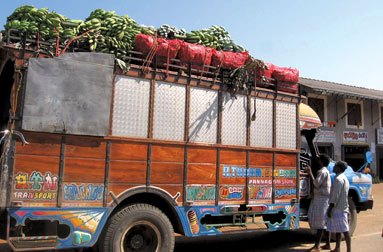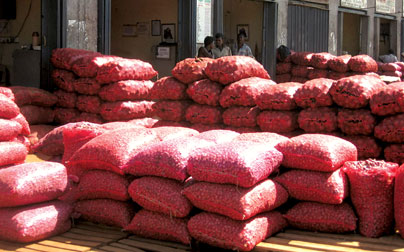|
Consumer pays the price:
Dambulla EEC: Business as usual
by Gamini WARUSHAMANA
The functions of the Dambulla Especial Economic Centre (EEC), the
main supply hub of vegetables and fruits in Sri Lanka continues as usual
under the previous management system.
 The Ministry of Consumer Affairs introduced a new system recently
with a trust appointed under the Secretary of the Ministry. This trust
was appointed to manage all 13 EECs in the country while earlier each
EEC was managed by a seperate trust. However, it is not yet effective. The Ministry of Consumer Affairs introduced a new system recently
with a trust appointed under the Secretary of the Ministry. This trust
was appointed to manage all 13 EECs in the country while earlier each
EEC was managed by a seperate trust. However, it is not yet effective.
Management
A spokesman for the ministry said that the management of the EECs was
reconstituted to end the mafia of traders that distort this essential
consumer goods market.
Obtaining the huge income which was lost to the government for long
years due to various irregularities in the tender procedure of the
stalls at the EECs, vehicle parks, toilets and canteens is another
objective.
Undue income
Those who lost their chances of earning undue income are protesting
against the change, he said. The Traders Association of the Dambulla EEC
resist this reform. The Secretary of the Traders’ Association I.A.
Wijeyananda said that they totally oppose the proposed management
reforms because the existing system works well.
According to the ministry, most of the stalls at the economic centre
are owned by a third party and not the traders or the farmers.
Rental
The monthly rental of a stall including VAT at the Dambulla EEC is
Rs.13,340 but most of them are now operated by a second party that pay
over Rs.100,000 monthly rental to the owners of the stall. All these
extra costs are borne by the consumers or are discounted against the
profits of the farmers.
The ministry spokesman said that there are irregularities in the
tender procedures followed in the lease of these stalls. Some stalls
have been leased for five years, some others for 10 or 30 years.
All these irregularities have to be corrected to ensure reasonable
prices to farmers for their produce as well as ensure a fair price for
consumers, he said.
The Traders’ Association said that this rental cost does not affect
the vegetable prices in Dambulla as the prices are determined on supply
and demand and the traders get only a commission from the trade.
Sathosa
Sathosa has taken over the management of the vehicle park and
cleaning service of the Dambulla EEC and the ministry expects a better
and cleaner environment in the EEC.
Dambulla EEC is located in the centre of farm lands where most of the
low country vegetables are grown.
It receives supplies from all over the country including Nuwara Eliya
and Welimada where upcountry vegetables are produced.
After the liberation of the North and the East, trade takes place in
both directions and most importantly supplies from Jaffna have made a
greater influence on prices.
Traders said that vegetable prices are declining due to supplies from
Jaffna. At least 20 lorries a day come from Jaffna with red onion, beet
root, potatoes, carrots, plantain, capsicum and other vegetables.
Supplies
Vegetable supply from Nuwara Eliya has almost stopped as there is no
production these days.
It will take another two months to restore the supply from Nuwara
Eliya.
The price indices of the Dambulla EEC shows over a 600 percent
vegetable price increase in the last month.
This has encouraged farmers and large scale vegetable farming has
commenced in Matale, Elahera, Bakamoona and Dambulla. The Project
officer of the EEC Samantha Sooriyagoda who regularly monitors market
price movements says this is the usual in the perishable commodity
market every year.
“There is no proper plan in cultivation. All farmers cultivate the
same vegetables and finally over supply reduces the price to zero.
Annually thousands of tonnes of vegetables are destroyed in this
market” he said.
 Trade at the Dambulla EEC takes place on commission basis. The
commission up to 10 Kg is fifty cents and it increases with the weight
as Rs.2/kg for 10-30 kg, Rs.3/kg for 30-60 kg, Rs.4/kg for 60-90 kg and
Rs.5/kg for over 90 kg. Trade at the Dambulla EEC takes place on commission basis. The
commission up to 10 Kg is fifty cents and it increases with the weight
as Rs.2/kg for 10-30 kg, Rs.3/kg for 30-60 kg, Rs.4/kg for 60-90 kg and
Rs.5/kg for over 90 kg.
Margins between producer price and wholesale price is thin but there
is a huge gap between wholesale price and retail price which includes
losses due to damage and transport cost.
Baskets
For instance the producer price of potatoes in Jaffna last week was
around Rs.55-60/ kg and the whole sale price at Dambulla was
Rs.65-67/kg.
However, the retail price was Rs.100/kg.
Although the Ministry is planning to introduce plastic baskets to
transport vegetable to reduce huge post harvest losses, there is not a
single trader or farmer using these baskets at Dambulla EEC.
The Management of the EEC said, around 90 percent of traders are
willing to transfer to the new transport system.
However, the traders said it will significantly increase vegetable
prices as transport cost will increase by two or three fold.
Traders Association said that this plastic basket system in
transportation will create some other issues as well.
It will reduce the wetness of the vegetables and reduce weight.
Wijeyananda said that if 25 kg gunny sacks are used the damages can be
reduced.
A lorry owner who transports vegetables to Kegalle said that using
gunny bags he can transport 3000 kg of vegetables.
However, using plastic baskets he can only transport 1200 kg.
Traders, farmers and transporters said that the authorities should
pay their attention to some critical issues prevailing in the EEC.
Price
The actual price that commodities are traded are not displayed at
stalls.
This is unfair for the farmers and there is no transparency in the
trade.
The trading in the Dambulla EEC has been computerised under a project
implemented several years ago.
Therefore, displaying the prices in an electronic display board is
easy.
Non availability of a rest room causes difficulties for traders and
drivers who travel from long distance.
Traders also said that there should be shelters to the compounds of
the stalls where most of the vegetables and fruits are exchanged between
farmers and buyers.
|

